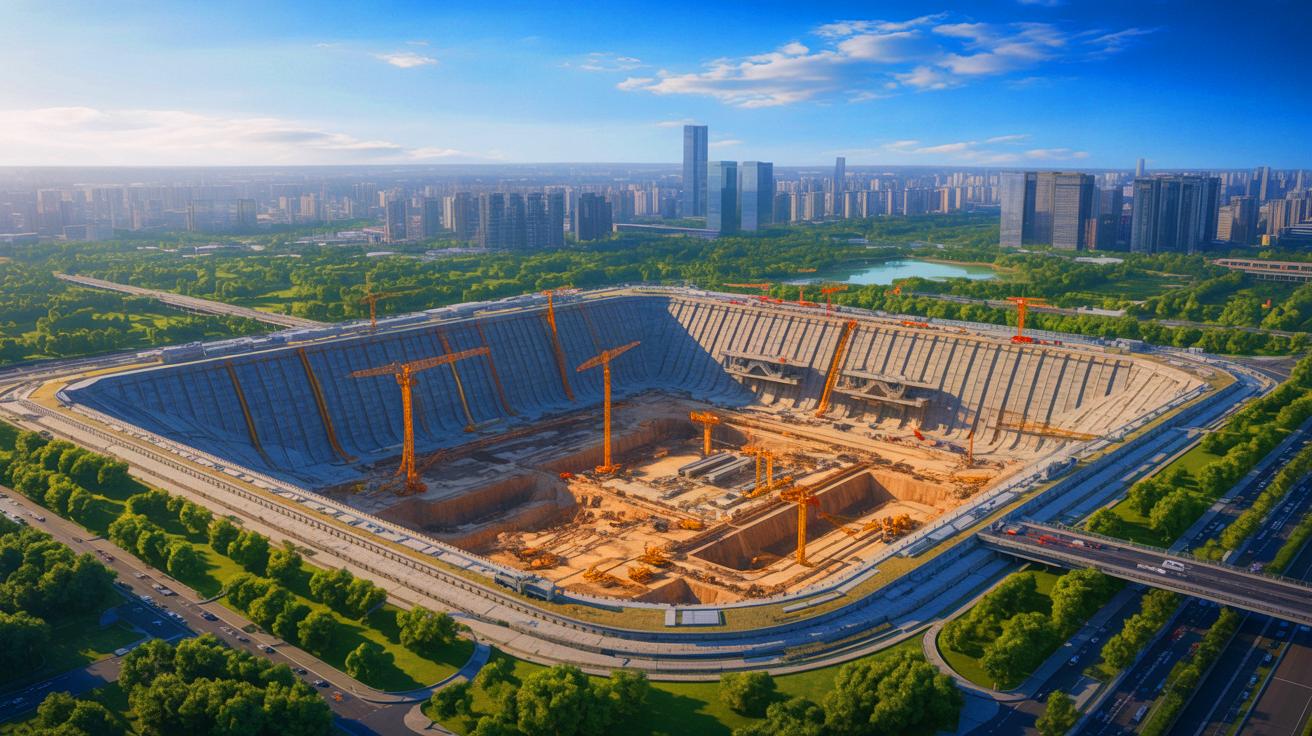- 🛰️ Satellite images reveal China’s construction of a massive underground military command center near Beijing.
- ⚔️ This development marks a shift in global power dynamics and raises concerns about geopolitical tensions.
- 🔍 The facility incorporates advanced technological sophistication and reflects China’s long-term military objectives.
- 🌐 Neighboring countries are reassessing their security strategies in response to China’s expanding military presence.
Recent satellite images have provided startling insights into China’s expanding military capabilities, revealing the construction of what could become the world’s largest underground military command center near Beijing. This project underscores China’s strategic ambitions to rival the United States and reshape the global power balance. As geopolitical tensions simmer, this development has drawn reactions from across the globe, prompting a reevaluation of security strategies by various countries. Understanding the breadth and implications of this construction is essential for analyzing the evolving dynamics in global security and military strategy.
China’s Ambitious Military Vision
China’s ambitious military project reflects a long-term vision aimed at securing its position as a global power. The underground military command center near Beijing is a testament to this vision, echoing Cold War-era strategies with modern technological advancements. Since the 1980s, China has invested in constructing underground shelters and bunkers, aiming to protect its military assets from potential threats. This current project, however, pushes previous efforts to new heights, potentially establishing the largest facility of its kind.
The scale of this undertaking is monumental and signals China’s determination to fortify its military infrastructure. In an age where technology and strategic positioning are paramount, China’s focus on subterranean command centers highlights a sophisticated approach to national defense. By investing in such infrastructure, China not only protects its military capabilities but also challenges existing power structures, particularly in Asia, where regional tensions are increasingly prominent.
Implications for Global Security
The ramifications of China’s new military development extend far beyond its borders, influencing global security dynamics. As China enhances its military capabilities, other nations must reconsider their defense strategies. This project is not merely about military expansion; it signifies a shift in global power dynamics, especially in Asia. The strategic importance of this command center could alter military alliances and defense postures worldwide.
China’s actions might prompt responses from other major powers, potentially sparking an arms race reminiscent of past Cold War tensions. The United States, for example, may find it necessary to strengthen its military presence in Asia to counterbalance China’s expanding influence. Such developments raise critical questions about future international relations and whether global powers can find pathways to cooperation amidst growing strategic competition.
Technological Sophistication and Strategic Depth
The underground military command center near Beijing is expected to incorporate cutting-edge technologies, showcasing China’s commitment to military innovation. Advanced communication systems and defense mechanisms are likely to be integral components of this facility. These technological advancements reflect China’s broader goal of becoming a leading military power, capable of challenging the United States and other established military giants.
The strategic depth of this project is also noteworthy. By focusing on subterranean infrastructure, China is ensuring the resilience of its military capabilities. This approach not only shields its assets from traditional threats but also positions China as a robust force in any potential future conflicts. The construction of this command center marks a pivotal moment in China’s military strategy, characterized by foresight and innovation.
Regional Reactions and Future Prospects
The unveiling of China’s underground command center has prompted varied reactions across Asia. Neighboring countries are watching closely, with some expressing concerns about the potential impact on regional stability. Others are exploring strategic alliances to counterbalance China’s growing military presence. This development has undoubtedly led to a reassessment of defense strategies throughout the region, as nations navigate the shifting geopolitical landscape.
Looking forward, the success of China’s military project will depend on its ability to manage regional relationships and address international concerns. The completion of this command center could redefine China’s role on the global stage, potentially fostering new diplomatic engagements. However, it also raises pivotal questions about whether this development will lead to increased international cooperation or exacerbate existing tensions.
As China continues to expand its military capabilities, the world remains on alert. The construction of this underground command center is a clear signal of China’s intent to assert its influence globally. In this era of rapid geopolitical shifts, how will other nations respond to China’s growing military prowess? Will these developments lead to greater collaboration among global powers, or will they heighten existing tensions?
This article is based on verified sources and supported by editorial technologies.
Did you like it? 4.4/5 (24)
